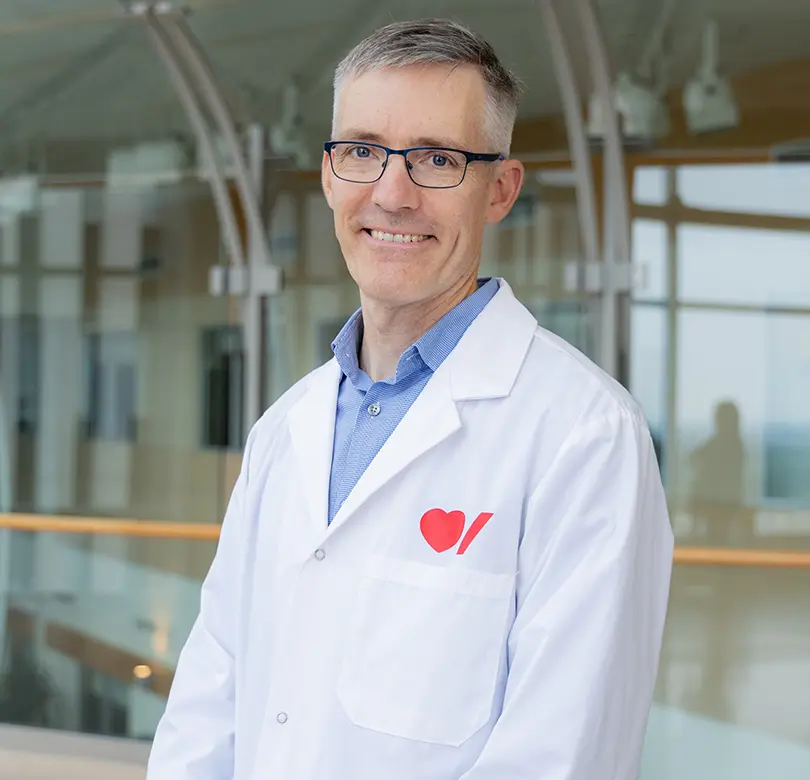As an adult with congenital heart disease (CHD) you have contact with many professional healthcare providers who need to know about your heart issues:
- your cardiologist
- your primary healthcare provider (doctor or nurse practitioner) and healthcare team
- your dentist
- your pharmacist
- specialists treating you for other health conditions
Your healthcare providers need to know about your CHD because you are at higher risk than the general population for heart problems. Your heart can be affected by medications, anesthetics, alternative therapies, contraception, pregnancy and infections.
Be prepared to share your basic heart health history when accessing care. Examples:
- what your heart defect is called
- whether you had surgery and when
- the names of the medications you take and their doses
- any allergies you have
- the name of your primary healthcare provider or cardiologist.
You should carry this information with you. On the Sick Kids Hospital website or mobile app, you can create your own MyChart account for secure access to your health record information. Or you can wear equipment or identifiers (e.g. a MedicAlert bracelet or necklace).

Dr. Mackie leads CHD care transitions for healthier futures.

Who should you see about your heart?
Simple congenital heart defects: People with simple (mild) heart defects have a higher risk of medical complications, even years later. If you have a scar on your chest or back from heart surgery, you should see a cardiologist specializing in adult CHD at least once, regardless of treatment outcome.
The adult cardiologist will decide if you need to be seen regularly and who should oversee your care. They might refer you to a “general” or “community” cardiologist as well as a general practitioner (GP). These doctors will see you in a private medical office rather than a hospital clinic. Since not every community has a cardiologist, you may need to travel to another area for your appointments.
If you have a simple heart defect and have never visited an adult CHD specialist, contact the adult CHD centre nearest you to make an appointment.
| Degree | Examples |
|---|---|
| Simple |
Mild pulmonary stenosis |
| Repaired ventricular or atrial septal defect | |
| Moderate | Coarctation of the aorta |
| Ebstein anomaly | |
| Milder forms of tetralogy of Fallot | |
| Complex | Any of the single ventricular disorders such as hypoplastic left heart syndrome or tricuspid atresia; likely already managed by a Fontan-type procedure |
| Transposition of the great arteries with a Mustard type of repair | |
| Any type of congenital heart disease that causes cyanosis (not enough oxygen getting to the body's tissues) | |
| Complex tetralogy of Fallot |
Moderate / complex heart defects: If you have a moderate or complex heart defect you must be seen by an adult CHD specialist. You have a higher risk of health complications than people without CHD. Your adult CHD cardiologist is the best person to advise you on how to stay healthy.
If you have had a heart procedure named after a physician (Blalock-Taussig shunt, BT shunt, Fontan, tetralogy of Fallot, Mustard or Ebstein for example) you are considered to have complex CHD and must be seen by an adult CHD cardiologist routinely. If you are seeing a community cardiologist, ask for a referral to an adult CHD cardiologist or contact the adult CHD centre nearest you.
The different kinds of cardiologists
The kind of cardiologist you see depends on the type or complexity of your condition. If you have simple CHD, you may need less monitoring than someone who has complex CHD. Again, if you had heart surgery as a child or young adult, make sure you see a cardiologist specializing in adult CHD. Let them decide who should care for you and your heart.
Community cardiologists (non-CHD cardiologists) more commonly see people with acquired heart disease (heart conditions that develop after birth) and not CHD. You may see a community cardiologist instead of an adult CHD cardiologist or you may see both. This is based on the type of heart defect you have and your overall health.
It is important to know that acquired heart disease and congenital heart disease are very different. Recommendations for people with acquired heart disease DO NOT always apply to adults with CHD.
Working with your primary healthcare provider
A family doctor or nurse practitioner may be your primary healthcare provider. This person is the link between you, your cardiologist and other healthcare providers. Be sure to keep your primary healthcare provider informed about your general health.
Your primary healthcare provider is the person who helps you to find resources, understand the information you have been given and refers you to a specialist when necessary. Ask them if they are receiving reports from your cardiologist and other healthcare specialists. If not, find out what needs to be done to make this happen. You want to make sure that all of your healthcare providers are kept up-to-date with your medical information.
What to look for in choosing a primary healthcare provider
Treating CHD is a specialized field. Your primary healthcare providers may not have much experience treating people with CHD, especially adult CHD. It’s important for you to be well-informed about your heart condition and to carry relevant information with you to share at appointments. Find a primary healthcare provider who is willing to learn about your heart history, as well as understand your current and future health needs and collaborates with specialists as necessary. Finding a healthcare provider that is a good fit for you is important and may take some time and effort, but open and respectful communication should be a top priority.
For questions about contraception, pregnancy and exercise, your primary healthcare provider may need to consult with an adult CHD specialist. The recommendations for you might differ from those without CHD. For example, an adult CHD cardiologist might advise you against using certain types of birth control, becoming pregnant, or taking part in some physical activities like weight lifting or scuba diving.
Your primary healthcare provider should also be proactive in keeping you healthy in other ways, such as offering you vaccines to prevent seasonal flu and pneumonia. This is because many people with a chronic disease – especially involving the heart and lungs – are less able to fight infections.
You might be more susceptible to respiratory tract infections. This can lead to serious complications and even death. For example, people with lung congestion and/or low immunity are more likely to develop a bacterial infection that has to be treated with antibiotics. Another example is that people with shunts have increased blood flow in the lungs, which makes them more likely to develop a lung infection.
You may want to bring a support person to medical appointments with you. Sometimes this is helpful when you are having a difficult conversation or receiving a lot of information.
Working with community care providers
Throughout your life with CHD you will meet many healthcare providers in your community:
- community cardiologists (non-CHD cardiologist)
- cardiac rehabilitation specialists
- dentists
- dietitians
- mental health specialists
- obstetricians and gynecologists
- physiotherapists and occupational therapists
- pharmacists
- social workers

If any of these people are giving you medical treatment or recommending a rehab or exercise program, they should know about your heart defect.
Cardiac rehabilitation
Regular, moderate physical activity is good for most adults with CHD. However, it is important for you to check with your adult CHD cardiologist before beginning any cardiac rehab or exercise program. They will be able to give you advice or recommend a fitness program suitable for your needs.
Dentist
Maintaining excellent oral hygiene is important for people with CHD because of their increased risk of developing a heart infection called infective endocarditis. Bacteria can destroy the heart valves and spread infection to other major organs in the body. The most common source of bacteria is our mouths, especially the teeth and gums. Your dentist should know about your heart defect so they can give you advice on how to maintain good oral hygiene with regular brushing and flossing.
Visits to the dentist every six months are recommended for people with CHD. Teeth cleaning and other dental work, can allow bacteria to enter the blood stream and travel to the heart. Some people with CHD – including people with an artificial heart valve – need to take antibiotics before dental work to help prevent infection. If you aren’t sure if you should take antibiotics, talk to your cardiologist and your dentist.
Pharmacist
Your pharmacist is part of your healthcare team. They need to know about your heart defect, so they can give you their professional advice about:
- how to take your medication (time of day, with food or without and so on)
- interactions with other medications
- interactions with non-prescription drugs like vitamins and herbal remedies
- foods to avoid.
Your pharmacist can also give you reminders to make sure you don’t miss a dose or a prescription renewal.
Other healthcare providers
Any time a medical procedure is recommended to you, your healthcare provider should know about your heart defect. They have to decide if you should take antibiotics to prevent infective endocarditis
If you are going to have surgery and be sedated, the anesthesiologist should speak to your cardiologist first to understand your specific risks. You may need special monitoring and management during surgery.
Key messages
- If you had heart surgery as a child, or if you had heart surgery named after a person (Mustard, Fallot, Ebstein for example), you should be seen at least once by an adult CHD cardiologist to decide if you need regular follow-up and monitoring.
- Before any type of surgery, speak to your cardiologist. Make sure the surgeon knows about your heart defect and your specific risks.
- Keep a paper or electronic record about your heart defect, including all of the details about your medications and doses, surgical or medical interventions, allergies and emergency contact information.
Related information
Stay informed and connected to other people with congenital heart disease.
- The Canadian Congenital Heart Alliance (CCHA) is a predominant organization in Canada for people with CHD and their families. They offer patient education days and informal opportunities to meet other young people with CHD.
- The Adult Congenital Heart Association (ACHA) is a US adult CHD organization.
- Join a Facebook group for online support.
- Heart & Stroke Community of survivors
- Tetralogy of Fallot adult community
- Zipper sisters: Women with CHD
- Congenital heart defects awareness
- CHD adults 50 and over
For healthcare providers:
To learn more about CHD, check our other webpages.
- Heart valve disease
- Heart valve surgery
- CHD transition
- Birth control and CHD
- Pregnancy and CHD
- CHD: What to watch for
- CHD transition tip sheet (PDF)
- CHD: What you need to know (PDF)
- CHD: What parents need to know (PDF)
This information was written by Shelagh Ross – who lives with congenital heart disease – in collaboration with cardiologist Erwin Oechslin; nurse practitioner Barbara Bailey, ACHD program, Peter Munk Cardiac Centre; and family physician Alan Bell, Toronto.
